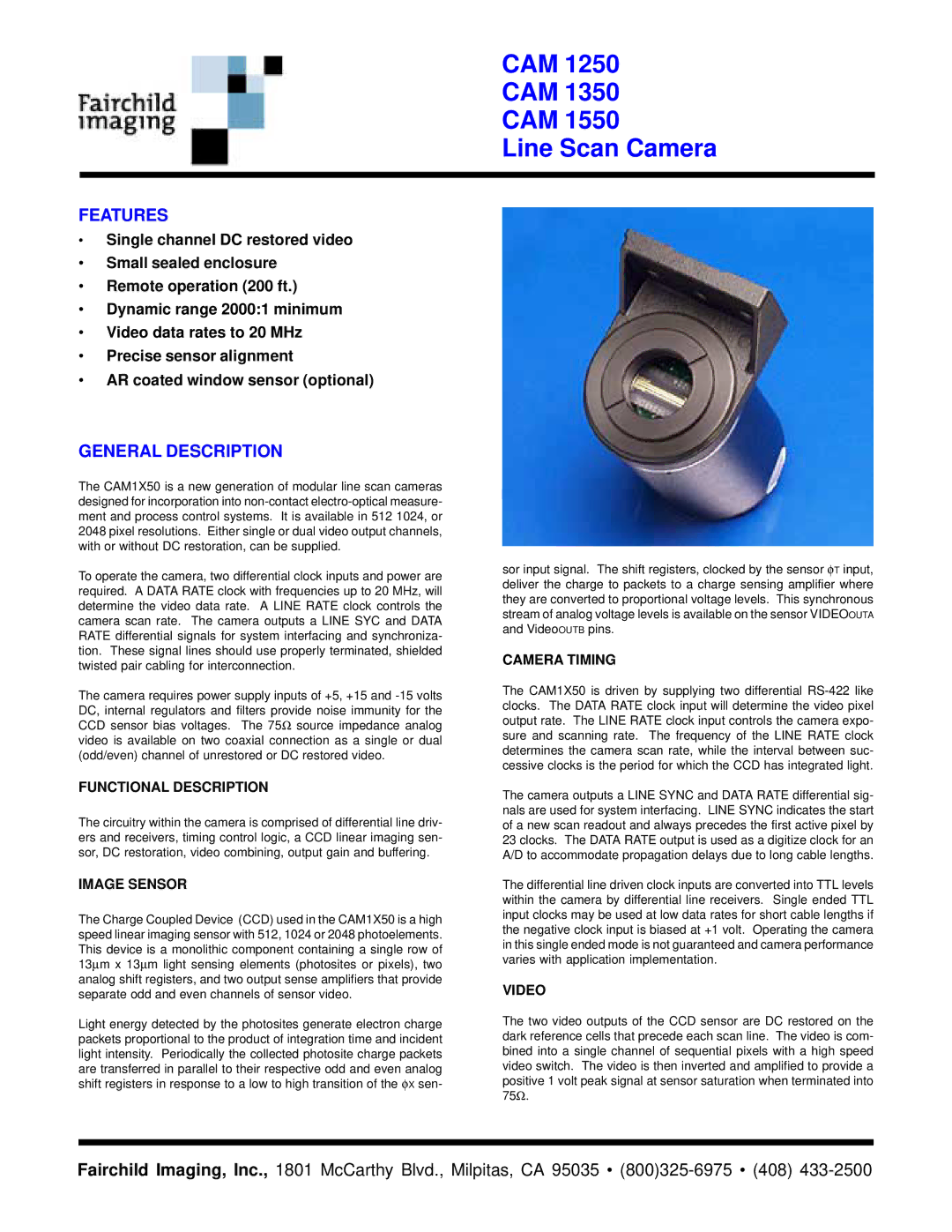
CAM 1250
CAM 1350
CAM 1550
Line Scan Camera
FEATURES
•Single channel DC restored video
•Small sealed enclosure
•Remote operation (200 ft.)
•Dynamic range 2000:1 minimum
•Video data rates to 20 MHz
•Precise sensor alignment
•AR coated window sensor (optional)
GENERAL DESCRIPTION
The CAM1X50 is a new generation of modular line scan cameras designed for incorporation into
To operate the camera, two differential clock inputs and power are required. A DATA RATE clock with frequencies up to 20 MHz, will determine the video data rate. A LINE RATE clock controls the camera scan rate. The camera outputs a LINE SYC and DATA RATE differential signals for system interfacing and synchroniza- tion. These signal lines should use properly terminated, shielded twisted pair cabling for interconnection.
The camera requires power supply inputs of +5, +15 and
sor input signal. The shift registers, clocked by the sensor φ T input, deliver the charge to packets to a charge sensing amplifier where they are converted to proportional voltage levels. This synchronous stream of analog voltage levels is available on the sensor VIDEOOUTA and VideoOUTB pins.
CAMERA TIMING
The CAM1X50 is driven by supplying two differential
FUNCTIONAL DESCRIPTION
The circuitry within the camera is comprised of differential line driv- ers and receivers, timing control logic, a CCD linear imaging sen- sor, DC restoration, video combining, output gain and buffering.
IMAGE SENSOR
The Charge Coupled Device (CCD) used in the CAM1X50 is a high speed linear imaging sensor with 512, 1024 or 2048 photoelements. This device is a monolithic component containing a single row of 13µ m x 13µ m light sensing elements (photosites or pixels), two analog shift registers, and two output sense amplifiers that provide separate odd and even channels of sensor video.
Light energy detected by the photosites generate electron charge packets proportional to the product of integration time and incident light intensity. Periodically the collected photosite charge packets are transferred in parallel to their respective odd and even analog shift registers in response to a low to high transition of the φ X sen-
The camera outputs a LINE SYNC and DATA RATE differential sig- nals are used for system interfacing. LINE SYNC indicates the start of a new scan readout and always precedes the first active pixel by 23 clocks. The DATA RATE output is used as a digitize clock for an A/D to accommodate propagation delays due to long cable lengths.
The differential line driven clock inputs are converted into TTL levels within the camera by differential line receivers. Single ended TTL input clocks may be used at low data rates for short cable lengths if the negative clock input is biased at +1 volt. Operating the camera in this single ended mode is not guaranteed and camera performance varies with application implementation.
VIDEO
The two video outputs of the CCD sensor are DC restored on the dark reference cells that precede each scan line. The video is com- bined into a single channel of sequential pixels with a high speed video switch. The video is then inverted and amplified to provide a positive 1 volt peak signal at sensor saturation when terminated into 75Ω .
Fairchild Imaging, Inc., 1801 McCarthy Blvd., Milpitas, CA 95035 •
